As soon as they hear the alarm call of the parent bird, baby African jacanas will freeze in place, appearing as if they are dead, until the predator flies away.
Baby jacanas play dead upon hearing the alarm call of the parent bird. (Video: National Geographic)
This video clip is part of the Super/Natural documentary series aired on National Geographic on February 7, showcasing a group of baby African jacanas. Found throughout the sub-Saharan regions of Africa, this unique wading bird has very long toes, allowing them to walk efficiently on floating vegetation like water lilies in shallow waters. The newly hatched chicks are miniature replicas of the adults, with disproportionately large feet compared to their bodies.
According to Steph Thompson, the producer of the show, the chicks emerge from the eggs knowing how to walk, swim, and communicate with each other. They can operate completely independently from the parent birds, but their survival instincts are so strong that as soon as a parent sounds the alarm indicating that a predator is nearby, the chicks immediately freeze in place, appearing to play dead. Once the danger has passed, the parent bird approaches and lifts the chick up.

This unique wading bird has very long toes.
African jacanas have evolved a highly unusual mating system, where females mate with multiple males. Only the males incubate the eggs and care for the young. Male jacanas even develop the ability to tuck the chicks under their wings. Their large feet help distribute their weight over a larger area, an adaptive feature beneficial in their habitat.
Thompson explains that their large feet allow jacanas to occupy a unique ecological niche. They can walk among lily pads, keeping a safe distance from terrestrial predators. If there is a threat from above, they can use their beaks as snorkels to stay submerged until the danger has passed.
The Super/Natural program employs the latest technology to reveal the secret powers of various animal species, according to producer Bill Markham. The series captures fascinating superpowers of animals, from the highly sensitive sense of smell of polar bears tracking seals from kilometers away to ibex goats climbing the sheer surfaces of dams in the Alps.


















































